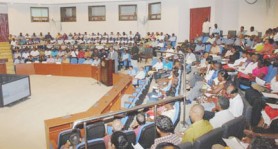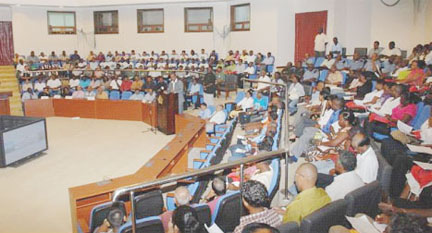The government’s inability to adequately police the high seas will see the administration turning to technology to help protect fisherfolk, President Bharrat Jagdeo yesterday told an event to mark Fisherman’s Day.

Speaking at the first-ever Fisherfolk Convention at the Guyana International Conference Centre, he urged the assembled stakeholders to appreciate the difficulty of the task given the “vastness of the sea” and the area under operation by fishermen.
He acknowledged that security was a major issue for fisherfolk given the high incidence of piracy adding that the matter had been discussed at length. To that end he said a pilot project would be launched soon with “one or two co-ops” to explore a way forward.
Jagdeo also revealed that the government was prepared to put a system in place to allow small fishermen to access low interest financing from the commercial banks as was done with single parent households.
Under such a facility the banks would not have to pay corporate taxes on those loans which in turn would allow them to lower their interest rates, the president pointed out. According to the president, fisheries was one of the “catalytic sectors” under the Low Carbon Development Strategy (LCDS) and is in a position to garner major consideration for resources gained under the low carbon umbrella.
“At some stage … we will have to ensure the productive sectors gain prominence,” he said.
Minister of Agriculture Robert Persaud also addressed the piracy issue following discussions later in the day and elaborated on the president’s remark on the use of technology. He said that some four of the five million dollars which had been identified for the Anti-Piracy Revolving Fund would be utilised to purchase tracking devices to place on vessels in tandem with fishing co-ops.
“For every two the co-ops install we will install one,” Persaud said. He added that they want to have the system in place within two months but this would depend on the response from fisherfolk. The minister also stated that he was in favour of arming “qualified” fishermen. He added that people had a right to protect themselves and it was up to the state to facilitate this; however he noted the fear expressed by some fisherfolk that bearing arms would make them targets for criminals.
Earlier during the opening ceremony, Chairman of the Georgetown Fishermen’s Co-op Society, Mohammed Khan, had highlighted piracy and smuggling as two of the major problems affecting fishermen.
Khan said that though piracy has abated somewhat the issue is far from solved since pirates “would go in front of the courts and after a few months they are back out again.”
The matter was also raised during a group discussion on security and safety where it was pointed out that the definition of piracy by the United Nations made it hard for criminals attacking vessels in Guyana’s territorial waters to be charged with that offence.
According to article 101 of the 1982 United Nations Convention on the Law of the Sea, piracy consists of
(a)any illegal acts of violence or detention, or any act of depredation, committed for private ends by the crew or the passengers of a private ship or a private aircraft, and directed:
(i)on the high seas, against another ship or aircraft, or against persons or property on board such ship or aircraft;
(ii) against a ship, aircraft, persons or property in a place outside the jurisdiction of any State;
Minister Persaud said government had toughened the laws to ensure that what was termed piracy locally was made a non-bailable offence but there were still legal loopholes allowing criminals to be granted bail or their cases to be dismissed. In most cases, he said the prosecutors sought charges which could be supported by the evidence leading to charges for bailable offences.
Meanwhile, GDF Coast Guard Lieutenant Andre Cush said while many may be quick to chastise the authorities’ response to offences at sea the truth was a matter of “time and space.” According to Cush they could not patrol over 200 miles of seas with the resources available.
“What would make our efforts effective is collaboration with the fisherfolk, the police and the Coast Guard.”
He added that sometimes by the time a report is made about an attack as much as 24 hours had passed making pursuit impossible. The fisherfolk were urged to purchase handheld radios and UHF sets to aid the flow of timely communication.
“Getting that information to us is always essential; we might not be able to apprehend the pirates in the act but that information helps us to narrow the search,” Cush said. According to the officer, the problem is “not as extreme” as is often thought but that a collective effort would be needed to combat it.
There were also recommendations for assistance to market fish products and that fishing products be made VAT free; to the latter Persaud noted that basic fishing inputs were already VAT free when purchased under the fishing co-ops.
Meanwhile, in his message to mark the day Persaud said that even among the challenges there were opportunities that could be seized as he pointed out the disastrous oil spill in the Gulf of Mexico but added that they must act quickly.
“Prices of fishery products have increased by as much as 40 percent as supply has shrunk and with one-third of the fisheries in the Gulf being forced to shut, prices may rise even further.”
He noted that Guyana has been recertified to export shrimp to the US and that from his discussions with the experts there may be a way to increase exports in a sustainable manner.
The event included presentations by officials from government and other entities on issues such as repositioning the industry, aquaculture, security and safety, mangrove restoration and local fisheries management. Break-out sessions were also held on the various topics. The sessions were meant to address the effectiveness of the government’s Fisheries Management Plan launched some three years ago and the global fisheries environment.
Recommendations from the convention are expected to be compiled and forwarded to Cabinet.

